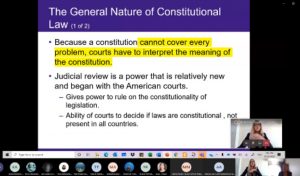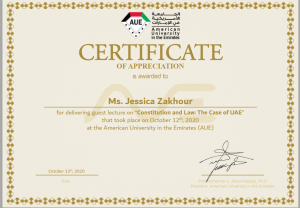Guest Speaker: Ms. Jessica Zakhour
Under the supervision of Faculty Ms. Karoline
Ms. Zakhour is an Associate Lawyer at TCC Law Firm in Beirut. In addition, she was appointed as a Participating Lawyer at Legal Advice Middle East in Dubai and a Participating Lawyer at Housing Monitor (Public Works Studio) – www.housingmonitor.org. Ms Zakhour additionally holds the position of Legal Consultant at the Embassy of Brazil in Beirut, Sin el Fil .
The questions to be discussed :
1. What is a constitution? What is a law? What is the difference?
2. What are the main roles of a constitution?
3. What are the types of constitution?
4. What are the two types of Laws followed ( common and civil)?
The presentation was on Monday October 12, 2020. A certificate was awarded.
Below are some of the pictures taken during the session and sample student reports.


Guest Speaker Reflection Esra Abdulqader – 171410056
On October 12, 2020, we interviewed our guest speaker, Mrs. Jessica Zakor, lawyer and Legal consultant at the Embassy of Brazil. We discussed the difference between statutory law and constitutional law, and we learned about the constitution and its different types, in addition to the legal systems in the world. What is the Statutory Law? The statutory law is a law that is formulated and approved by the legislative councils or parliament. It is known as an ordinary law. This type of law has the advantage that it can be changed from time to time in an easy way by legislators. With the continuous evolving of societies and depending on the circumstances in which societies may evolve, laws may require changing. this is the reason for the existence of this type of law because ordinary laws can be changed easily. For example, when the COVID-19 pandemic occurred in the world, some countries began enacting laws in an attempt to control the spread of the pandemic among members of society, by which there was a law to curfews for certain hours, and to impose fines for individuals not following precautionary measures and social distancing such as wearing masks, leaving distances and preventing social gatherings. All of these laws are temporary or statutory laws based on what society is going through and what it needs to control the pandemic. It is possible that these laws may be canceled at a later time or amended according to the community’s needs. What is the Constitutional Law? Constitutional laws are the rules and provisions mentioned in the constitution of the state. This type of law is difficult to change because it represents the basic rules for any state. Running head: KINGDOM OF SWEDEN What is the Constitution? The constitution is that document that carries all the rules and customs of any state in addition to the system of government, and the principles of government and its administration, whether written or not. It is the highest law in the state and no other laws can contravene them, that’s why constitution laws are very difficult to change. In order for any state to be established, it must draft a constitution that defines its strength and principles. The constitution reflects the identity of the state in terms of language, religion, culture, etc. The constitution is the one that guarantees the rights of citizens and defines their duties towards their homeland through the laws and provisions of the constitution. Types of Constitution: Federal Constitution In the federal constitution, power is divided between certain parts of the country, so each part has an independent government with its own laws set by the legislative bodies, an example is the United Arab Emirates. Unitary Constitution As for the unitary constitution, there will be a central government that has a supreme legislative body to lay down laws for the entire country. An example is the United Kingdom. Legal Systems: The only two legal systems adopted around the world are the common law system and the civil law system. During the lecture, Mrs. Zakkour quoted a quote from the English philosopher Jeremy Bentham who lived under the common law legal system, to explain the difference between civil law and common law, and said: “The power of the lawyer in the uncertainty of the law.” This quote applies to common law to a large extent, but also applies to civil in some way. Running head: KINGDOM OF SWEDEN Civil Law Civil laws are codified laws, and they are sometimes referred to as “code of law.” The origins of civil law came from Roman law. It is a set of legal principles that include all the rules of the judiciary and courts, such as penalties and sentences. The role of the judge in civil law is represented in investigating the case and directing charges in addition to issuing judgments, but all of this is within the framework of specific legal rules and principles. Common Law Common law is not codified, which means that there is no complete compilation of legal principles, unlike civil law, which contains a set of legal rules that are followed by courts and judges. In common law, judges rely on judging precedents or judicial decisions taken in previously similar cases. These precedents are recorded and documented as case laws through legal reports. Conclusion It was a lecture full of valuable information on the issue of the constitution in its various types and legal systems around the world. I was very happy to learn about these differences between the types of laws and the importance of the constitution in defining the identity of states.









